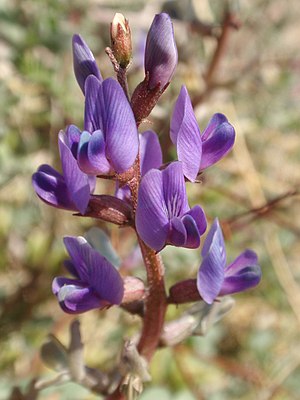Note: This is a project under development. The articles on this wiki are just being initiated and broadly incomplete. You can Help creating new pages.
Difference between revisions of "Astragalus strobiliferus"
| (One intermediate revision by the same user not shown) | |||
| Line 1: | Line 1: | ||
| + | [[File:Astragalus 01 (6921564020).jpg|thumb|right]] | ||
'''Astragalus strobiliferus''' is a low-growing, thorny, deciduous shrub. This plant is one of the many species of Astragalus family. It has been recommended for cultivation as a gum crop. | '''Astragalus strobiliferus''' is a low-growing, thorny, deciduous shrub. This plant is one of the many species of Astragalus family. It has been recommended for cultivation as a gum crop. | ||
==Uses== | ==Uses== | ||
| Line 57: | Line 58: | ||
==Photo Gallery== | ==Photo Gallery== | ||
<gallery class="left" caption="" widths="140px" heights="140px"> | <gallery class="left" caption="" widths="140px" heights="140px"> | ||
| − | + | Astragalus 01 (6921564020).jpg | |
| + | Astragalus inyoensis.jpg | ||
| + | Astragalus soxmaniorum.jpg | ||
| + | Soldiersfootmili00munsrich Fig51&51 The relation of the astragalus to the os calcis in the normal foot (left) and the flat foot (right).png | ||
| + | Красивый цветок..jpg | ||
| + | Վայրի բնություն-1 274.jpg | ||
</gallery> | </gallery> | ||
| Line 68: | Line 74: | ||
==External Links== | ==External Links== | ||
| − | * [ ] | + | * [http://temperate.theferns.info/plant/Astragalus+strobiliferus Astragalus strobiliferus on temperate.theferns.info] |
| − | + | ||
| − | |||
[[Category:Herbs]] | [[Category:Herbs]] | ||
[[Category:Pages without herbs images]] | [[Category:Pages without herbs images]] | ||
Latest revision as of 16:19, 13 August 2020
Astragalus strobiliferus is a low-growing, thorny, deciduous shrub. This plant is one of the many species of Astragalus family. It has been recommended for cultivation as a gum crop.
Contents
- 1 Uses
- 2 Parts Used
- 3 Chemical Composition
- 4 Common names
- 5 Properties
- 6 Habit
- 7 Identification
- 8 List of Ayurvedic medicine in which the herb is used
- 9 Where to get the saplings
- 10 Mode of Propagation
- 11 How to plant/cultivate
- 12 Commonly seen growing in areas
- 13 Photo Gallery
- 14 References
- 15 External Links
Uses
Parts Used
Chemical Composition
It contains flavones, flavonols, flavanones, flavanonols, chalcones, aurones, isoflavones, isoflavanes, and pterocarpans.[1]
Common names
| Language | Common name |
|---|---|
| Kannada | |
| Hindi | |
| Malayalam | |
| Tamil | |
| Telugu | |
| Marathi | |
| Gujarathi | |
| Punjabi | |
| Kashmiri | |
| Sanskrit | |
| English |
Properties
Reference: Dravya - Substance, Rasa - Taste, Guna - Qualities, Veerya - Potency, Vipaka - Post-digesion effect, Karma - Pharmacological activity, Prabhava - Therepeutics.
Dravya
Rasa
Guna
Veerya
Vipaka
Karma
Prabhava
Habit
Identification
Leaf
| Kind | Shape | Feature |
|---|---|---|
Flower
| Type | Size | Color and composition | Stamen | More information |
|---|---|---|---|---|
| {{{5}}} |
Fruit
| Type | Size | Mass | Appearance | Seeds | More information |
|---|---|---|---|---|---|
Other features
List of Ayurvedic medicine in which the herb is used
Where to get the saplings
Mode of Propagation
How to plant/cultivate
Astragalus species that produce tragacanth gum are generally low-growing, spiny shrubs found in windy, usually semi-arid regions, often in mountaisn but also near the coast.[3]
Commonly seen growing in areas
Temperate to alpine regions of the Himalayas.
Photo Gallery
References
- ↑ Chemical constituents
- ↑ [Morphology]
- ↑ Cultivation






